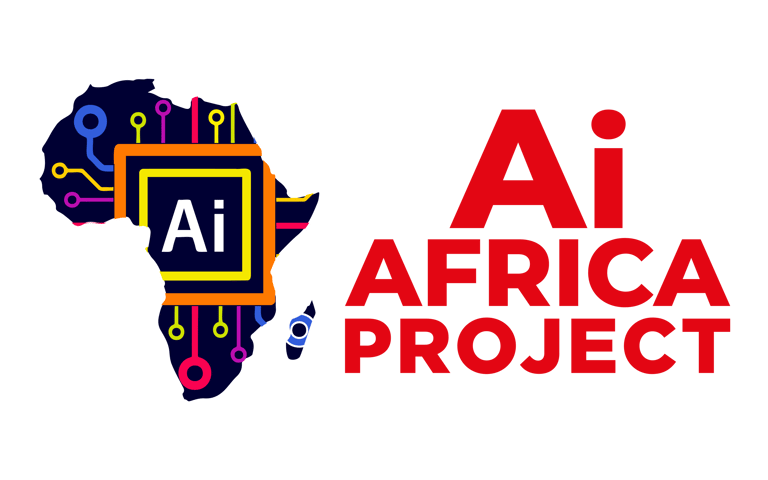SMARTCHICK360 WEEK 4 PERFORMANCE SNAPSHOT
Location: Nyankpala, Northern Region
Reporting Period: 8th–15th July 2025
Cycle Days: 15–21
Flock Size: 149 Cobb 500 broilers
Project Theme: Intelligence in Every Feather
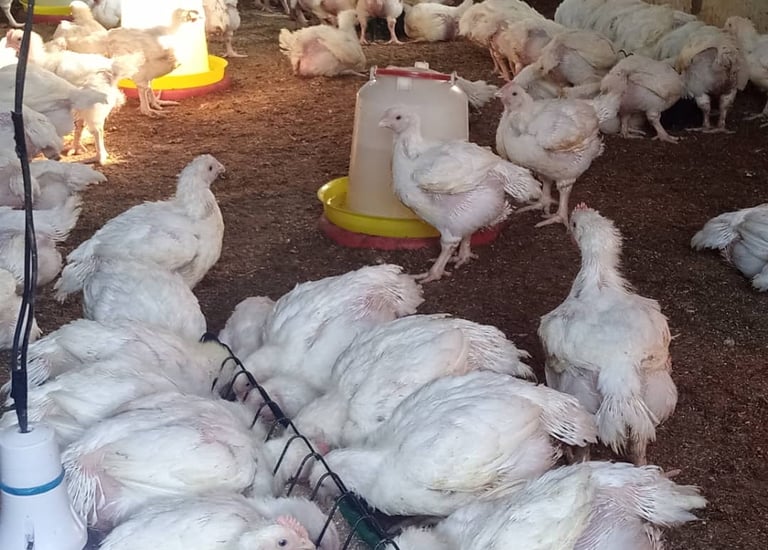

Project title
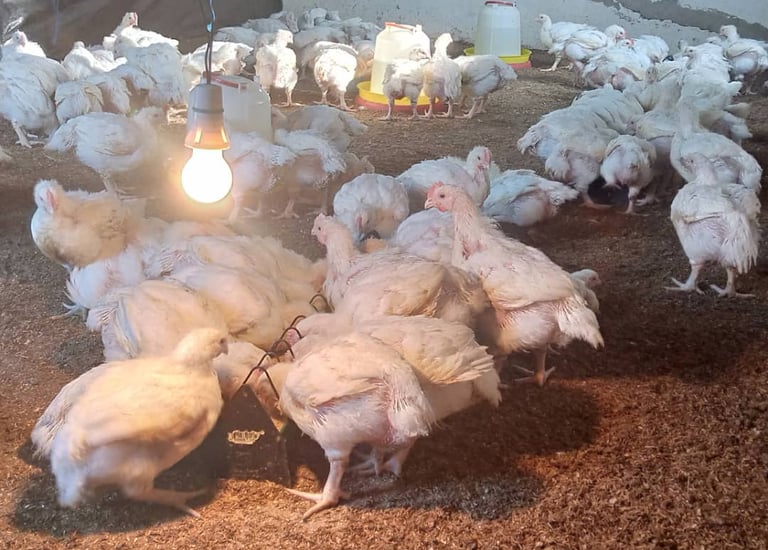

SMARTCHICK360 WEEK 3 PERFORMANCE SNAPSHOT
Location: Nyankpala, Northern Region
Reporting Period: 8th–15th July 2025
Cycle Days: 15–21
Flock Size: 149 Cobb 500 broilers
Project Theme: Intelligence in Every Feather
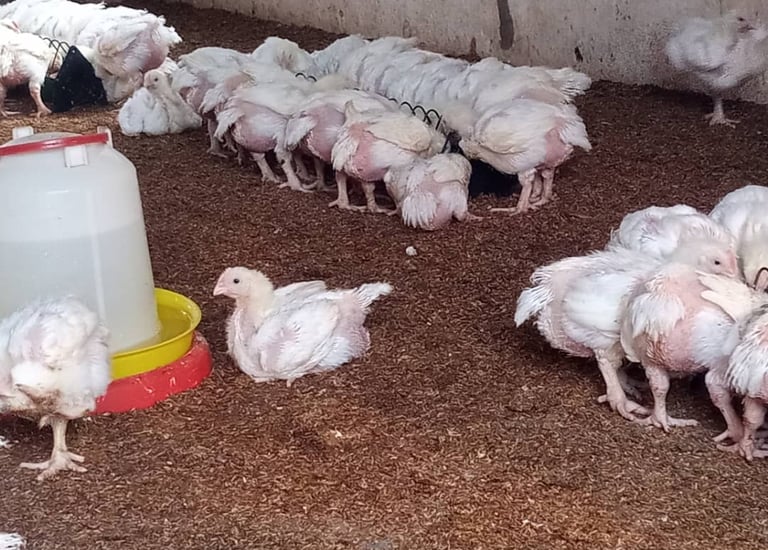

📊 Key Performance Metrics
Average Weight (Day 21): 1.136 kg (on target)
Daily Feed Intake: Ranged from 15 to 17 kg
Daily Water Intake: Consistently 50 L
Feed Conversion Ratio (Estimated): 1.55–1.6
Mortality: Zero deaths recorded for the week
Newcastle Booster: Pending—scheduled for administration on Days 21–22
🔍 Performance Highlights
The flock exhibited a strong growth trajectory, with average weight increasing from 1.05 kg to 1.136 kg over the past week. Body weight and feathering remained uniform across nearly all birds, reflecting effective management and a stable environment. There were no signs of vaccine-induced stress or illness, and the litter remained consistently dry and free from odour. Chicks demonstrated robust feeding and drinking behaviour, further indicating optimal flock health.
🐣 Week 1 (Days 1–7 | 24–30 June 2025)
The cycle began with 151 Cobb 500 chicks settled into a purpose-designed brooder in Nyankpala. With dry, absorbent bedding, well-positioned lighting, and ample feeders and drinkers, the environment was primed for a healthy start. Key interventions included the timely administration of the first Newcastle vaccine on Day 7. Average weight by the end of the week stood at approximately 264.5 g, with daily intake around 9 kg of feed and 30 L of water. No mortalities occurred, and the flock showed uniform behaviour and excellent post-vaccination recovery—delivering a seamless, robust foundation for subsequent growth.
🐣 🧪 Health Summary
Recovery following the Gumboro vaccination was smooth, with no respiratory symptoms or feed refusal observed. Immediate attention is now required to administer the Lasota booster vaccine to maintain effective viral protection as the birds approach maturity.
🚀 Recommendations for Week 4
Feed: Increase daily feed provision to 18–19 kg to support ongoing growth.
Water: Plan to supply 55–60 L of water per day as demand rises.
Space Management: Begin preparations for space expansion or thinning to ensure comfort as the flock size and individual bird weight continue to increase.
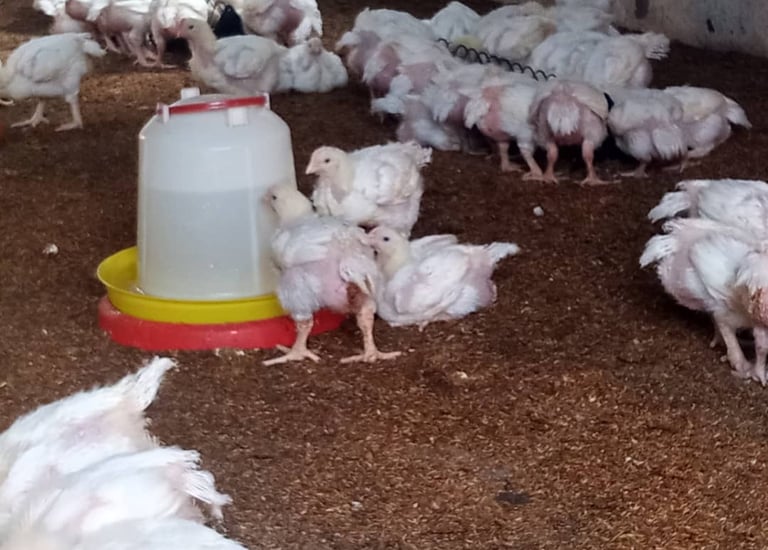

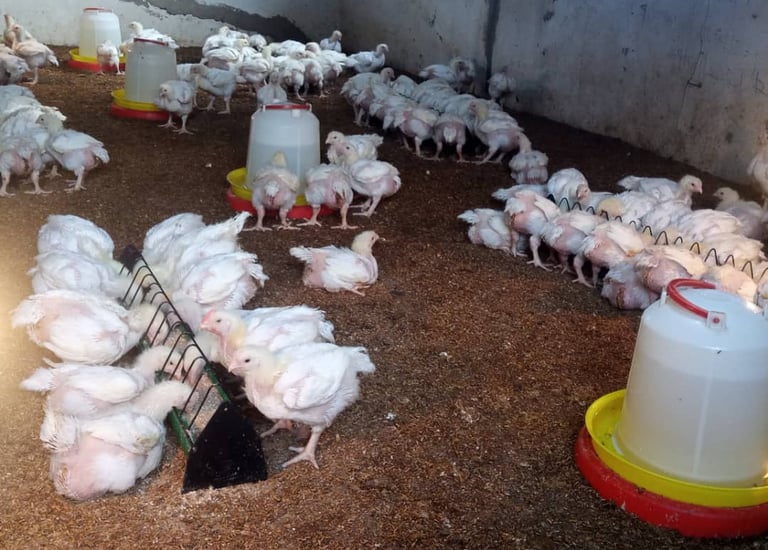

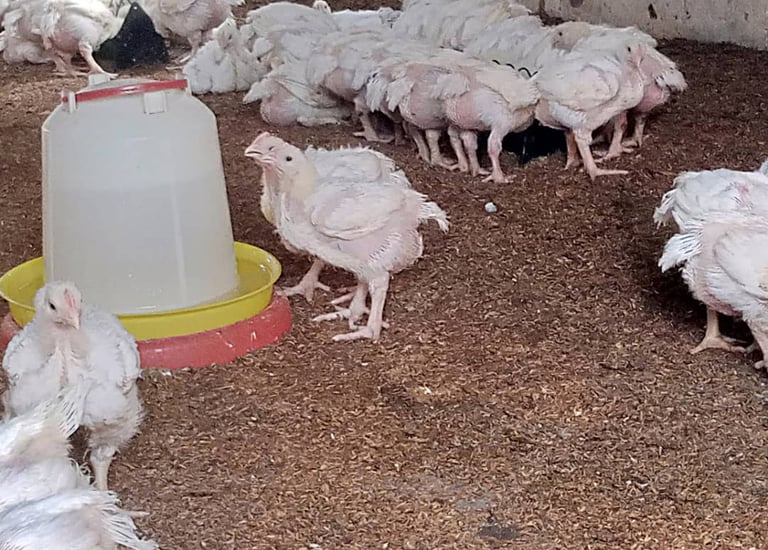

🚀 Week 3 (Days 15–21 | 8–15 July 2025)
By Day 21, the average bird weight had climbed to 1.136 kg, as feed intake increased to 15–17 kg per day and water consumption held steady at 50 L. Health remained outstanding, with zero mortalities and clear evidence of optimal management—uniform feathering, dry litter, active feeding, and no visible stress across the flock. The estimated feed conversion ratio for the period was 1.55–1.6, reflecting excellent efficiency. With the Newcastle booster vaccine now due, the operation remains tightly aligned with SmartChick360’s protocols and targets, confirming that precision management is producing both health and productivity gains.
📖 SmartChick360: The Week 1–3 Story
At the heart of the Northern Region, Osman’s SmartChick360 broiler project is redefining poultry success through the synergy of technology, attentive husbandry, and disciplined execution.
Week 1: Laying strong foundations, the chicks responded exceptionally to meticulous brooding and biosecurity, achieving zero mortality and healthy, uniform growth.
Week 2: As feeding regimes expanded and regular monitoring continued, the flock surged ahead in both weight and resilience. The transition through Gumboro vaccination was smooth, with SmartChick360’s data feedback ensuring early intervention and minimising risk.
Week 3: By the third week, birds had achieved target weights, maintained robust health, and demonstrated the value of precision management. With feed efficiency optimised and welfare indicators consistently strong, the stage is set for high performance through the remainder of the cycle.
🔮 Looking Forward: Week 4 & Beyond
Feed target: Scale up to 18–19 kg per day
Water target: 55–60 L per day to match growth and environmental needs
Weight goal: 1.7–1.8 kg by Day 28
Action plan: Administer vaccines, maintain vigilant daily checks, and leverage SmartChick360’s AI-powered insights for ongoing adjustments
This three-week journey underscores how data-driven observations, strict vaccination schedules, and responsive day-to-day management can turn a peri-urban broiler flock into a high-performance, low-risk enterprise. With SmartChick360, even smaller-scale farmers can meet—and surpass—commercial standards, minimising losses and maximising efficiency, productivity, and flock wellbeing
AI-Powered SmartChick360 Project
Farmer: Osman Ibrahim (Leader of Group 12)
Location: Nyankpala, Northern Region, Ghana
Cycle Start: 24th June 2025
Bird Type: Cobb 500 (151 chicks)
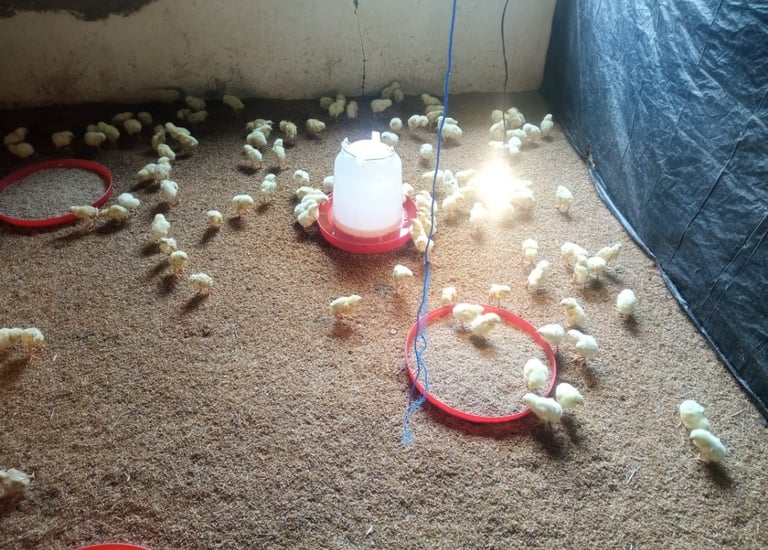

Based on the distribution of your chicks—neither clustered tightly beneath the lamp nor dispersed against the walls—and the clearly positioned heat lamp at the centre of the brooder, I would estimate the current micro-climate as follows:
Temperature:
Directly beneath the lamp (central “hot spot”): approximately 32–34 °C
At the outer edges (farthest from the lamp): approximately 26–28 °C
Relative Humidity:
Likely within the 55–65% range, as indicated by the dry (but not dusty) litter and the absence of condensation on the brooder walls.
These conditions fall comfortably within the recommended ranges for day-old broiler chicks (32–35 °C and 50–70% relative humidity). Please note, however, that without direct sensor readings, this assessment remains an informed estimate. If you have not done so already, it is advisable to install a basic thermometer and hygrometer to monitor and optimise your brooder environment on a daily basis.
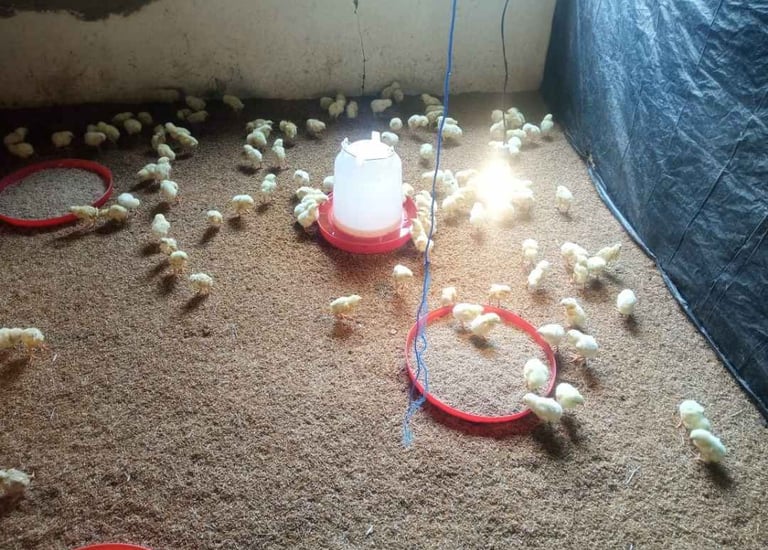

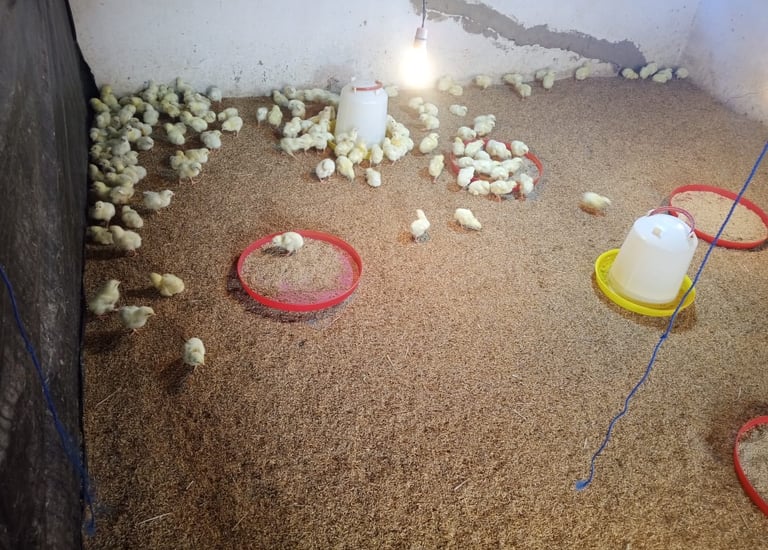

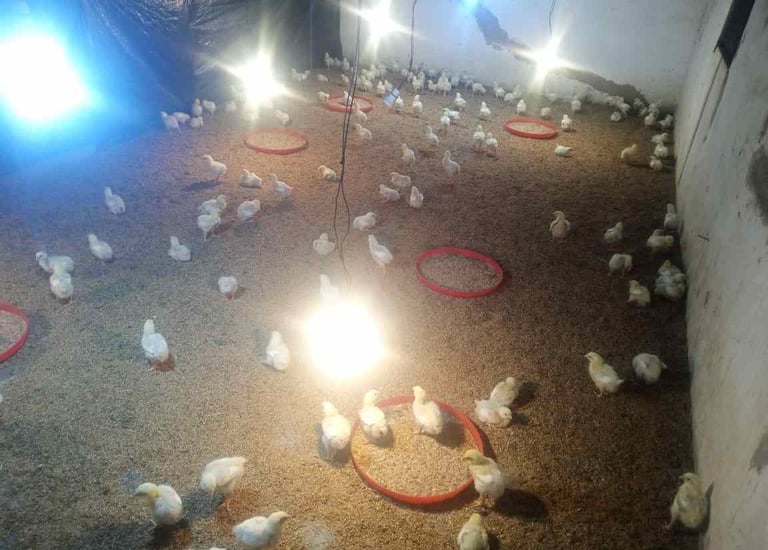

Day 2
Day 1-7
📷 Visual Assessment (Today’s Observations)
Bird Distribution:
Chicks are clustering tightly along the walls and corners, particularly beneath the bulbs. This pattern suggests localised overheating or light-related stress in specific zones.Feeder/Drinker Access:
While spacing appears adequate, only a handful of chicks are feeding or drinking—indicating uneven temperature distribution or excessive light intensity affecting comfort.Lighting Setup:
The bulbs are positioned close to the floor and emit strong white light, likely exacerbating heat build-up and causing stress-induced huddling, especially for Day 2 chicks.Inferred Brooding Conditions – Day 2
Based on today’s assessment, the temperature directly under the bulbs is estimated at 34–36 °C, which is higher than the recommended range and poses a risk of heat stress for the chicks. The average temperature in the room is slightly lower, around 30–32 °C, but this is still above the ideal target for Day 2 Cobb 500 broiler chicks, which should be maintained at 31–32 °C at chick level. Humidity levels are assumed to be in the region of 50–55%, which remains within the acceptable range for brooding at this stage.
Feed and Water Intake Forecast – Day 2
For Day 2, each chick is expected to consume approximately 17 grams of feed, amounting to a total of 2.57 kilograms for the entire batch of 151 birds. It is advisable to divide this feed into two or three rations distributed across the day to encourage consistent intake and reduce waste. In terms of water, each chick should have access to around 34 millilitres, which totals 5.13 litres for the group. Water should be changed every six to eight hours to ensure freshness and minimise the risk of contamination. As a best practice, always use weighed feed batches and avoid mixing new feed with old leftovers in the troughs, as this can help minimise waste and reduce the risk of bacterial growth.
Recommendations
To address the current brooding challenges, several immediate actions are recommended. Firstly, the bulbs should be raised by 10–15 centimetres to help reduce localised overheating and allow for a more even distribution of light and warmth throughout the brooder. Switching to red bulbs or, alternatively, reducing the intensity of the lighting is also advisable, as red light has a calming effect on chicks and helps to prevent clustering and stress that are often caused by harsh white light at chick level. In addition, repositioning feeders and drinkers nearer to areas where the chicks are currently crowding can encourage increased feed and water intake. It is also important to conduct checks every six hours to monitor how the chicks redistribute themselves and to ensure that they are accessing both feed and water after the lighting adjustments have been made.The daily management routine should include specific tasks to support optimal brooding conditions. These tasks include adjusting the bulb height in the morning, splitting the daily feed (2.6 kilograms) between the morning and afternoon, refilling water (5.1 litres) every six hours, and performing an evening behaviour check at 6:30 PM. Ensuring that each of these actions is completed on schedule will help maintain the right environment for chick health and growth.
Day 1
🐣 THE BROODER STORY: DAY 1 TO DAY 4
🌱 Day 1: New Beginnings (24 June 2025)
Day 1 marked a fresh start as 151 day-old Cobb 500 chicks arrived, bringing both energy and anticipation. The brooder house was meticulously prepared, with clean bedding, appropriately spaced feeders and drinkers, and carefully positioned heat lamps to provide a welcoming environment. As the chicks settled in, some gravitated towards the centre under the warmth of the lamps, while others explored their new surroundings. Initial feed and water consumption was measured at approximately 2.3 kg and 4.5 litres respectively—modest beginnings as the flock adjusted to its new home.
“Every chick is a seed. With care, light, and food, they will grow strong.”
🔥 Day 2: The Challenge of Excess Heat
On the second day, new challenges emerged. The intensity of the bulbs led to noticeable clustering of chicks under the lights and at the brooder’s periphery, signalling uneven heat distribution and light stress. Despite the provision of 2.6 kg of feed and 5.1 litres of water, a limited number of chicks approached the feeders, and the central brooder area remained conspicuously empty while the corners were crowded. Recognising these warning signs, immediate adjustments were made: bulbs were raised, feeders repositioned, and airflow within the brooder was reviewed to restore a more balanced and comfortable environment.
“They don’t speak, but their behavior is a language—one we must learn to read.”
🌧 Day 3: Coping with Weather Changes
Rainfall on the third day brought a drop in ambient temperature, introducing a new variable into the brooder environment. This time, the clustering of chicks was a response to the cold, with rising humidity compounding the situation. Osman responded swiftly—blocking drafts, maintaining lamp positions, and serving feed (3.3 kg) and water (6.3 litres) in intervals. These measures ensured that, despite the adverse weather, chick health was maintained and even distribution resumed by the afternoon, reflecting a stabilised microclimate.
“Rain will come, but your response determines whether it hinders or helps.”
💡 Day 4: Achieving Stability
By Day 4, the effectiveness of these interventions became evident. Chicks were evenly distributed, activity around feeders and drinkers increased, and the overall environment felt balanced and calm. Huddling and panting had ceased, replaced by healthy curiosity and improved appetite. Feed intake rose to 3.7 kg and water to 7.8 litres, with the litter remaining dry and the behaviour of the chicks reflecting growing well-being. With these signs of progress, Osman began planning the gradual reduction of temperature and weight monitoring for the days ahead.
“Each day, the brooder becomes less about survival and more about preparation for growth.”
📌 Reflection
The story of Days 1 to 4 is not simply about poultry management; it is a testament to attentive observation, timely intervention, and continual learning. The growth of the chicks depended not just on nutrition, but on the farmer’s commitment to monitoring every sign and adapting the environment as needed. Success in brooding, as in all of farming, is achieved through thoughtful observation, decisive action, and a daily investment of care.
“Farming isn’t guesswork. It’s observation, action, and love—day by day, degree by degree, gram by gram.”
Day 1-4
🌱 Day 1 – The Journey Begins
On June 24th, I welcomed 151 Cobb 500 chicks into my brooder house. Their arrival marked more than just the start of another cycle; it was the beginning of a new standard—one grounded in science, attentive care, and continual learning. The environment was meticulously prepared: warm, clean, and fully equipped. Yet, even from the first hours, I noticed some chicks huddling tightly under the lamps. That was my first reminder that true comfort relies not just on warmth, but on a careful balance of all conditions.
🔥 Day 2 – The Power of Observation
By the second day, the effects of lighting became apparent. The intensity was too high, causing chicks to avoid the feeders and cluster at the edges. Rather than viewing this as a setback, I treated it as essential feedback. I adjusted the lamp height, repositioned the feeders, and closely watched their behaviour. Gradually, the chicks began to distribute themselves more naturally. Each response, each area they favoured or avoided, provided valuable insight—I was learning to interpret their signals.
🌧 Day 3 – Weathering the Storm
Rainfall on the third day brought in cool drafts, and once again, the chicks began to huddle—this time seeking warmth rather than fleeing excess heat. I acted quickly, sealing gaps and ensuring the brooder’s temperature returned to a safe range. By afternoon, calm and normal activity had returned. Day 3 reinforced an important lesson: external climate shifts will inevitably affect the brooder environment, so readiness and rapid response are key.
☀ Day 4 – Achieving Harmony
On the fourth day, everything seemed to click. The chicks spread out comfortably, accessed feeders and drinkers without hesitation, and the signs of distress disappeared. It was clear that the previous days’ adjustments were effective. The brooder now functioned as a well-tuned system, supporting healthy, stress-free growth.
💡 Day 5 – Fine-Tuning for Success
Day 5 brought further confirmation of progress. The chicks confidently explored all areas of the brooder, feeder activity was robust, and no space was overcrowded. Careful management of heat, lighting, feed, and water was now paying off, and the SmartChick360 approach was clearly delivering results.
📈 Day 6 – Ready for Measurement
As Day 7 approached, visible growth was evident. The chicks’ movements became more deliberate, and their plumage began to fill out. It was time to prepare for the first major weight check—not simply to record a number, but as a testament to a week of attentive management and learning.
🎯 Day 7 – Results That Speak
On July 1st, exactly one week after arrival, the average chick weight was measured at 264.5 grams—far surpassing the target range of 145–165 grams, with an increase of over 60%. On the same day, the first Newcastle vaccine was administered, reinforcing that robust health outcomes are built on strong, consistent management, not just medication.
🧠 SmartChick360: More Than Luck
The success of SmartChick360 is no accident. It comes from a disciplined focus on detail—monitoring, adjusting, and learning from the birds themselves. Every chick offers feedback; it’s the farmer’s job to pay attention and respond. Whether adjusting feed schedules, light placement, or monitoring litter dryness, the week was a continuous exercise in attentive stewardship.
🐤 A Message to Fellow Farmers
Remember: your chicks won’t send messages or make calls when conditions aren’t right. But they always communicate—through their actions, their groupings, and their behaviour. Stay observant, remain adaptive, and trust the process. Intelligence in poultry farming is found not only in technology but in the eyes and actions of a responsive farmer.
This is SmartChick360—intelligence in every feather.
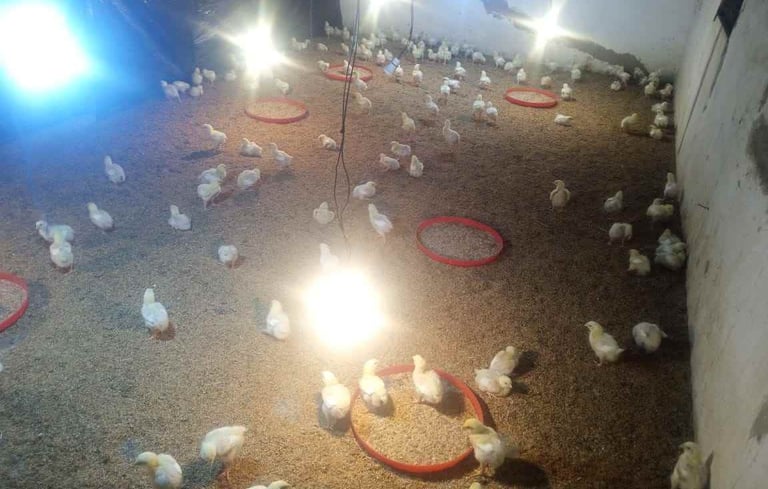

🔷 Week 2 Overview
The second week of the SmartChick360 cycle closed with notable achievements. Of the initial 151 Cobb 500 chicks, 149 remain, with two mortalities confirmed as non-disease-related after post-mortem review. The flock successfully received their Gumboro (Infectious Bursal Disease) vaccination on the evening of Day 14, with no clustering, feed refusal, or stress observed—a testament to optimal flock health and management. By the end of the week, the average chick weight had reached 734 g, significantly surpassing the Cobb 500 growth standards for this stage.
📊 Production Performance: Days 8–14
Throughout the week, the flock consumed approximately 64.5 kg of feed and 235 litres of water. This equates to an average of 433 g of feed and 1.58 litres of water per bird over the seven-day period. Average weight increased impressively from about 264 g at the start of the week to 734 g by Day 14. Feed conversion ratio (FCR) for the week ranged between 1.50 and 1.55, indicating excellent feed efficiency. The mortality rate stood at just 1.3%, with no disease outbreaks or vaccine-related setbacks. Vaccination milestones were met without complication, including Newcastle on Day 7 and Gumboro on Day 14.
📹 Visual and Behavioural Review
Photos captured during Days 8–14 highlight consistent feeder usage, dry and well-maintained litter, robust feather development, and a uniform spread of birds throughout the brooder. An image from the evening of Day 14, post-feeding and vaccination, shows a calm and healthy flock—a visual affirmation of effective management.
✅ Key Management Interventions
Several targeted actions contributed to these results. Feeding was optimised with three fresh rations daily, amounting to approximately 60 g per bird each day. Water was supplied at a rate of 30–40 litres per day, with morning and evening flushes to ensure freshness and sanitation. Lighting and temperature were maintained at 18 hours per day, with controlled brooder temperatures between 25–27 °C. Daily cleaning of feeders and drinkers, along with consistently dry bedding, helped sustain high standards of hygiene. All vaccination protocols were followed precisely, and all mortalities were investigated, with no disease-related issues identified.
💡 Insights and Success Factors
SmartChick360’s approach has driven rapid growth, efficient feed use, and excellent uniformity in bird development. The stable and controlled environment was crucial in supporting these gains. Notably, the vaccination programme was executed without any negative impact on the flock, ensuring strong immunity and ongoing performance.
🔜 Focus for Week 3
Looking ahead, it is recommended to monitor weights by sampling 10–15 birds every three days to ensure continued uniform growth, aiming for 1.2–1.3 kg by Day 21. The next Newcastle Lasota booster should be scheduled for Days 18–19. As the birds increase in size, begin preparing for de-crowding to maintain comfort and performance. Continue regular health checks, especially after vaccinations, to quickly identify any emerging issues.
🎯 SmartChick360 Takeaway
“This flock is not merely growing, but thriving—achieving an average weight of 734 g, boasting impressive feed efficiency, and enjoying robust health through proactive management and disease prevention. SmartChick360 is demonstrating how precision brooding and responsive care translate to profit and productivity from day one.”
Week 2
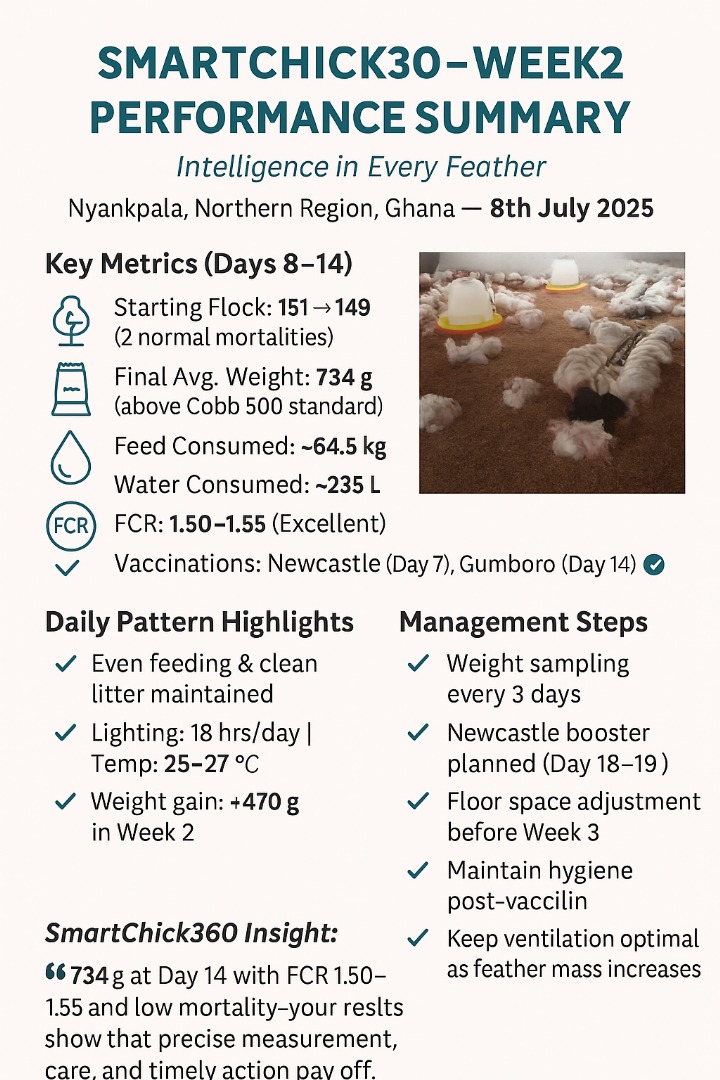



AI-Powered Research Labs
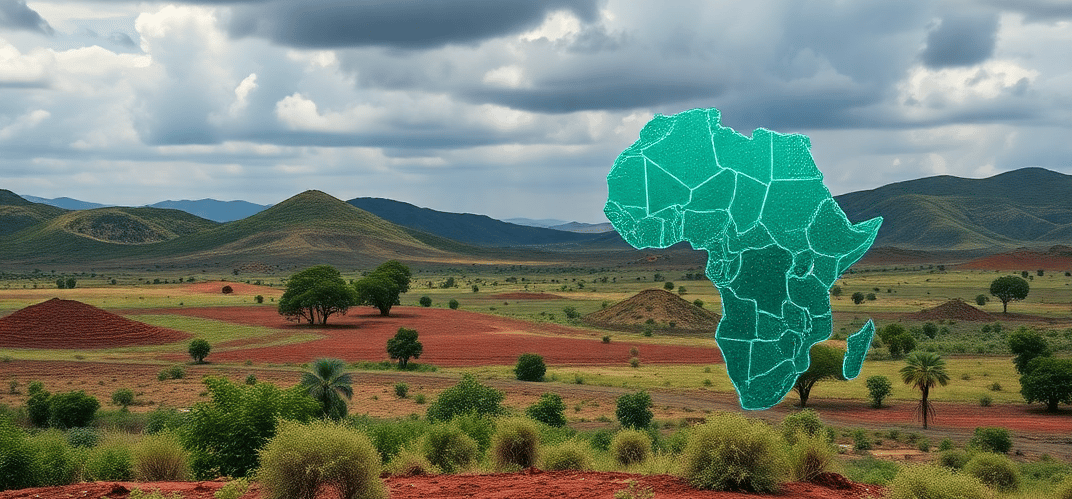

Harness the power of Artificial Intelligence to unlock Africa's trillion-dollar natural resource potential. Research 50 key economic sectors using advanced AI tools, machine learning, and data analytics to transform how Africa leverages its rich mineral, agricultural, and energy resources.
AI Research
Exploring AI's impact on Africa's key economic sectors.
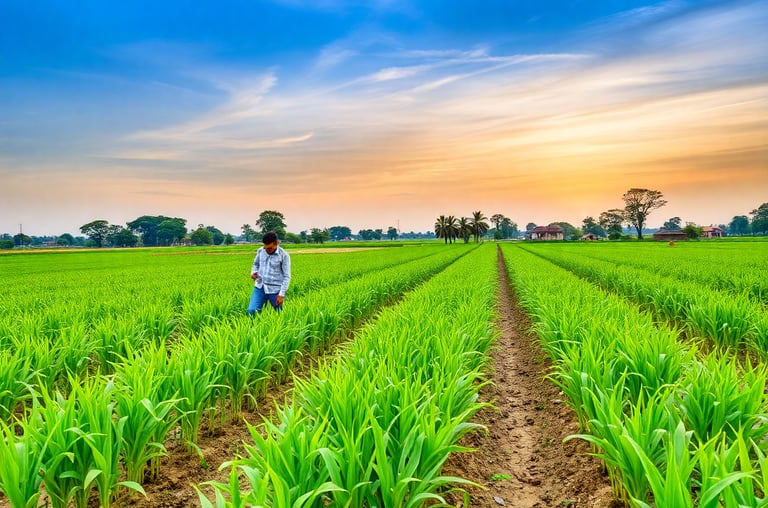

Agriculture (Crop Farming)
Crop farming is the backbone of Africa’s agricultural economy, contributing significantly to GDP, employment, and food security. It encompasses the cultivation of cereals, legumes, tubers, and vegetables. Key crops include maize, rice, millet, sorghum, yams, cassava, and groundnuts.
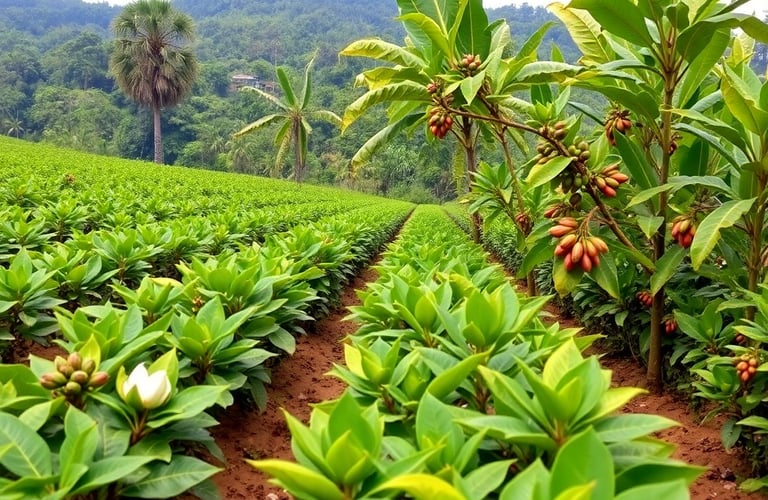

Cash Crop Farming (Cocoa, Coffee, Tea, Cotton)
Cash crop farming involves the cultivation of crops primarily for sale rather than subsistence. In Africa, cocoa, coffee, tea, and cotton are among the most vital exports, contributing significantly to foreign exchange earnings and rural livelihoods.
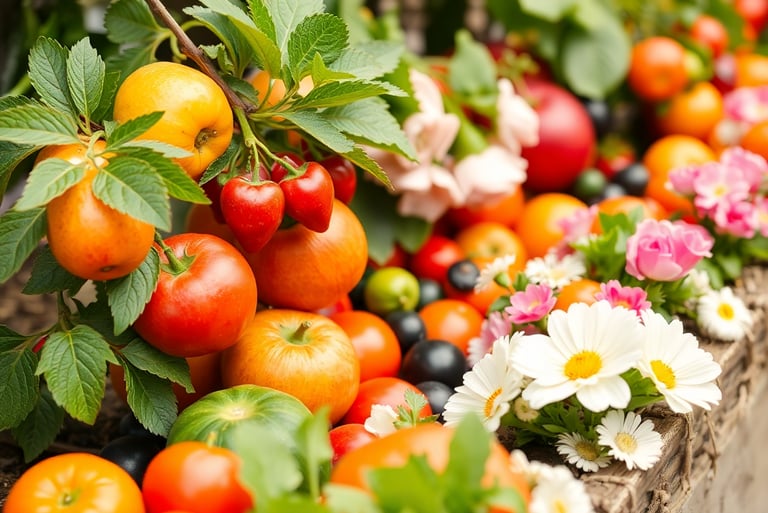

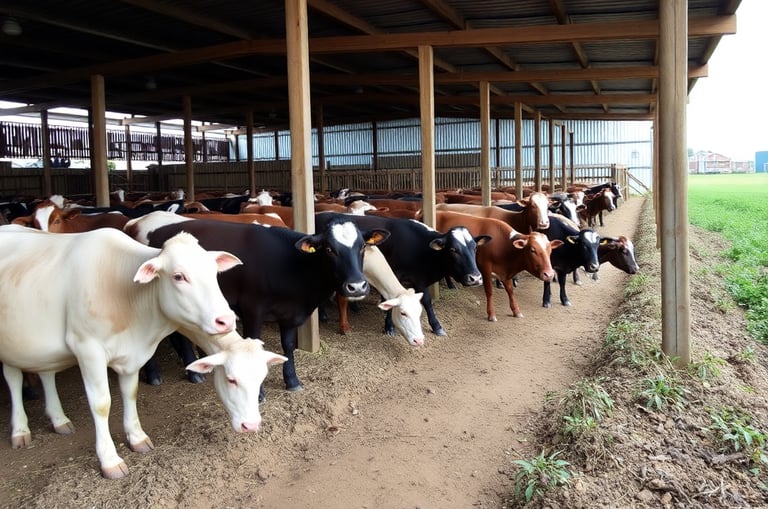

Horticulture (Fruits, Vegetables, Flowers)
Horticulture encompasses the intensive cultivation of high-value perishable crops such as fruits, vegetables, and ornamental flowers. It plays a crucial role in food security, nutrition, export earnings, and employment—especially for women and youth in rural and peri-urban areas. Despite its potential, the sector faces post-harvest losses of up to 50%, driven by poor logistics, market asymmetries, and lack of climate-resilient practices.
Livestock Farming
Livestock farming contributes substantially to food security, employment, and income generation in Africa. It encompasses cattle, goats, sheep, pigs, and poultry for meat, milk, eggs, hides, and wool. Livestock accounts for approximately 30–40% of agricultural GDP in many African countries, with rising demand due to population growth and urbanization (FAO, 2023). However, challenges such as disease outbreaks, low feed efficiency, limited breeding data, and market volatility continue to constrain sector performance.
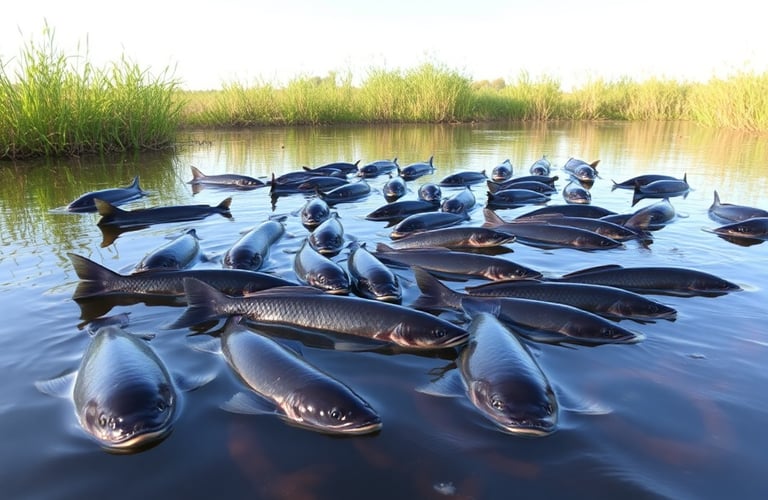

Fisheries & Aquaculture
Fisheries and aquaculture are vital to Africa’s food security, rural livelihoods, and export revenue. The sector provides direct employment to over 12 million people and contributes to the diets of more than 200 million Africans (WorldFish, 2022). However, challenges such as illegal, unreported, and unregulated (IUU) fishing, poor stock management, disease outbreaks in aquaculture, and post-harvest losses continue to threaten sustainability and profitability.
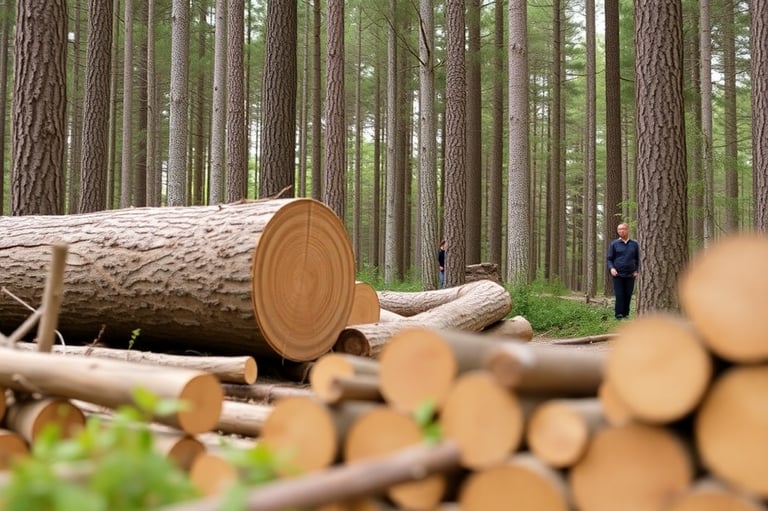

Forestry and timber production form a crucial part of Africa’s bioeconomy, supplying wood for domestic use, export, furniture, and construction. Africa hosts over 624 million hectares of forest, accounting for about 21% of its total land area (FAO, 2023). Key products include logs, plywood, sawn timber, and wood charcoal. However, unsustainable logging, weak forest governance, and climate change pose significant risks, leading to an average loss of 3.9 million hectares of forest annually (World Bank, 2022).
Forestry & Timber Production
Empowerment
Training youth and women for digital leadership.
CALL / WHATSAPP LINE
+233 559 853 572
© 2025. All rights reserved.
Conclusion: A $6 Trillion Opportunity Powered by AI
A 2023 analysis by the African Development Bank projects that full value chain development across Africa’s natural resource sectors could unlock over $6 trillion in cumulative economic value by 2040. AI will be instrumental in capturing this value through enhanced productivity, precision forecasting, climate resilience, and knowledge transfer.
The AiAfrica Project provides a unique opportunity to position African researchers and innovators at the forefront of this revolution. By establishing dedicated research labs, training centers, and AI deployment strategies across the 50 sectors, Africa can not only leverage its natural wealth but also secure its rightful place in the Fourth and Fifth Industrial Revolutions.
